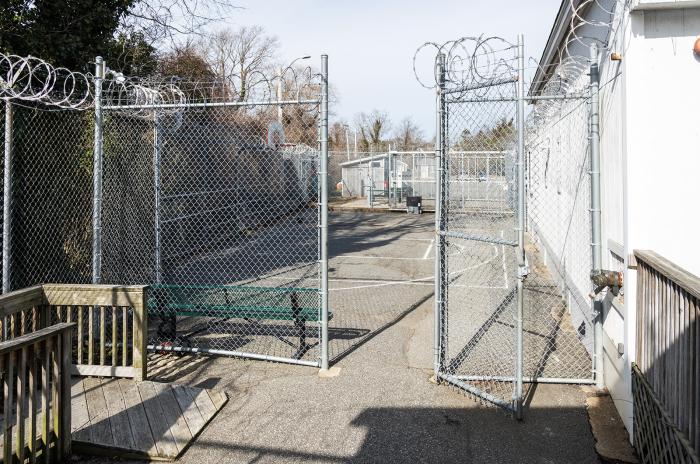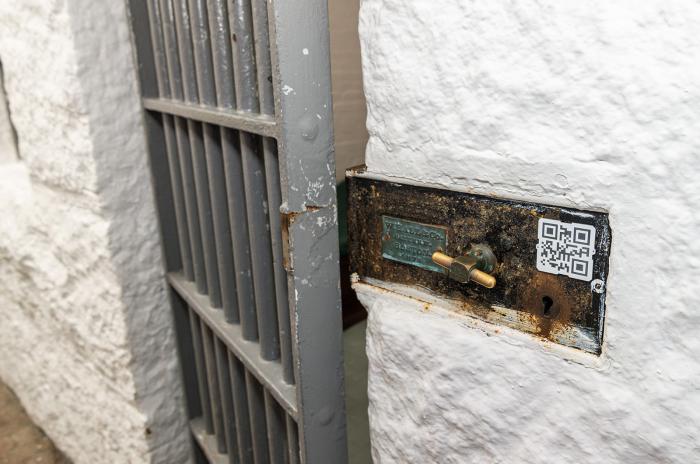Built when Ulysses S. Grant was president, the Dukes County Jail – which doubles as a county lockup for up to 800 arrestees each year – is marking its 150th year with critical needs for both capital and operational funding.
In an interview this week, Sheriff Bob Ogden outlined several of the challenges facing the aging facility, which the state acknowledges is badly outdated and is routinely cited for inadequacies by the Department of Public Health.
Because Island police stations don’t have their own lockups, the jail serves not only as a house of corrections for people who have been sentenced for crimes, but a jail for those remanded on bail and a lockup for people arrested in all six towns awaiting their first court date. The cost of running the lockup alone is about $1.4 million a year – more than a quarter of his total annual budget – but its operation is not factored into state funding, according to Mr. Ogden.
The facility itself is also in dire need of rehabilitation. Sometimes referred to as the “Graybar Hotel,” the jail is in a white clapboard building that at first glance resembles a whaling captain’s home. Located just outside Edgartown village on Upper Main Street, it was originally built in 1873.
Though it’s pretty on the outside, a 2021 audit by the state Department of Public Health found it couldn’t meet state standards on cell space and had poor plumbing, among other things.
Mr. Ogden, who was re-elected to a second six-year term as sheriff last November, called the jail “archaic” in the leadup to the election. He said this week that many of its issues are hard to solve because the facility is so old.
“We’re never be in compliance,” Mr. Ogden said. “We’re fighting an 1873 facility.”
Last summer, the state released $650,000 in bond funds, a fraction of what’s hoped will be a total of $6 million in allocations over four years, to improve the facility.
At the time of the first allocation, the sheriff’s office said that state-sponsored studies going back to 1990 showed a need to modernize the jail and lockup. Mr. Ogden said this week he is hopeful that additional bond funding will come through to start work on a site plan and the addition of modular buildings as a stopgap measure on the way to a larger rebuild.
In the meantime, he hopes the state legislature will act to help out with the regional lockup.
A bill filed last month by state Rep. Dylan Fernandes in the Massachusetts legislature would create a state fund to compensate the sheriff’s office for what Mr. Ogden says is an extra, unfunded burden.
The sheriff’s office has an annual budget of about $4 million paid by general funds designated for the house of corrections and jail. Further responsibilities were added in 2020 when the sheriff’s office was designated not only to be the lockup for people arrested in the six Vineyard towns, but also for people being held in protective custody, Mr. Ogden said.
Between 600 and 800 people pass through the lockup each year, Mr. Ogden said.
House Bill 2651 would establish a Dukes
County Sheriff Regional Lockup Fund to pay for the detention of “persons arrested with or without a warrant, taken into protective custody, held on contempt or by court order, or arrested under any civil process.” Creation of the fund, Mr. Ogden contends, would force Beacon Hill to recognize that the lockup is an extra assignment for the sheriff’s department and it needs its own designated income stream.
“This is something that’s been ignored for way too long,” said Mr. Ogden.
The sheriff made a similar appeal to a special state commission that was looking at how to fund correction facilities and sheriff’s departments in 2021.
At the time, the sheriff’s office told the commission that special considerations should be made for the Vineyard. At minimum, the department argued, the formula used to determine state funding shouldn’t solely rely on the inmate to staff ratio at the house of corrections, but also take into account the hundreds of people being held by the sheriff’s office before court.
“Such an approach may yield a more equitable outcome in demonstrating the under-funding of the Duke’s County Sheriff’s Office more clearly,” the office wrote to the commission.
The commission later concluded it could not evaluate appropriate levels of funding for different programs across the state for various reasons, including different clinical philosophies and varying overhead costs.
It’s not the first time that Mr. Ogden has sought a legislative remedy. Mr. Fernandes and Sen. Julian Cyr filed a similar bill in last year’s session, only to see it gain favor in one committee, but die in another.
The fact that it made some progress last year offered Mr. Fernandes some reason to be optimistic.
“I think it’s got a shot of passing,” he said.







